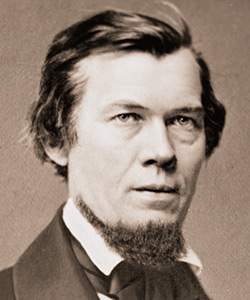Jacob Thompson (Congressional Biographical Directory)
Reference
THOMPSON, Jacob, a Representative from Mississippi; born in Leasburg, Caswell County, N.C., May 15, 1810; attended the public schools and Bingham Academy in Orange County; was graduated from the University of North Carolina at Chapel Hill in 1831; member of the faculty of the University of North Carolina in 1831 and 1832; studied law; was admitted to the bar in 1834 and commenced practice in Pontotoc, Miss., in 1835; elected as a Democrat to the Twenty-sixth and to the five succeeding Congresses (March 4, 1839-March 3, 1851); chairman, Committee on Indian Affairs (Twenty-ninth Congress); unsuccessful candidate for reelection in 1850 to the Thirty-second Congress; appointed to the United States Senate in 1845, but never received the commission; appointed Secretary of the Interior in the Cabinet of President Buchanan and served from March 6, 1857, to January 8, 1861, when he resigned; served as inspector general in the Confederate Army during the Civil War; confidential agent of the Confederacy to Canada in 1864 and 1865; settled in Memphis, Tenn., in 1868 and managed the affairs of his extensive holdings; died in Memphis, Tenn., March 24, 1885; interment in Elmwood Cemetery.
"Thompson, Jacob," Biographical Directory of the United States Congress, 1774 to Present, http://bioguide.congress.gov/scripts/biodisplay.pl?index=T000203.
Jacob Thompson (American National Biography)
Scholarship
Thompson began the most controversial part of his Confederate career in the spring of 1864. He and Clement Claiborne Clay, a former U.S. Senator from Alabama, were sent by Davis as special Confederate agents to Canada. The purpose of the mission, as explained by Confederate secretary of state Judah P. Benjamin, was to provoke a "disruption between the Eastern and Western States in the approaching election at the North." Supplied with a war chest of $300,000, Thompson was to do all in his power to demoralize the Union home front. The most grandiose of his efforts aimed at liberating Confederate soldiers from Union prison camps around the Great Lakes and instigating an uprising of disaffected Democrats in the Midwest that would culminate in the creation of a separate northwestern Confederacy. Little came of these…. Much of his money, as he detailed in a report of 3 December 1864, was used to hire arsonists to destroy property in northern cities. He explained that his goal was "to burn whenever it is practicable, and thus make the men of property feel their insecurity and tire them out with the war." The most spectacular example of this strategy occurred on 25 November 1864, when hired Confederate agents set fires at several hotels and buildings in New York City. The fires were extinguished with relatively little damage, but Thompson by now was a target of northern vengeance. He was blamed, wrongfully according to his account, for ordering the Confederate raid on St. Albans, Vermont…
William L. Barney, "Thompson, Jacob," American National Biography Online, February 2000, http://www.anb.org/articles/04/04-00986.html.



